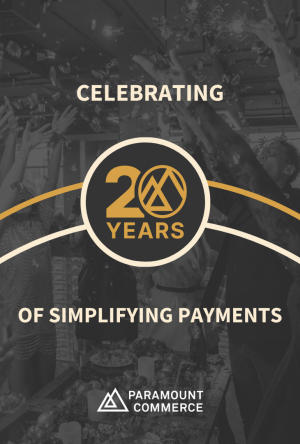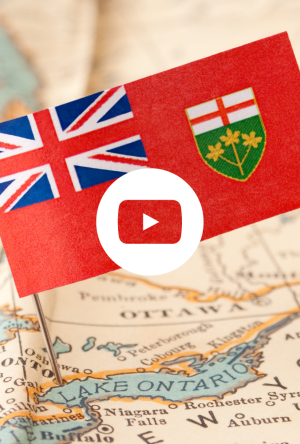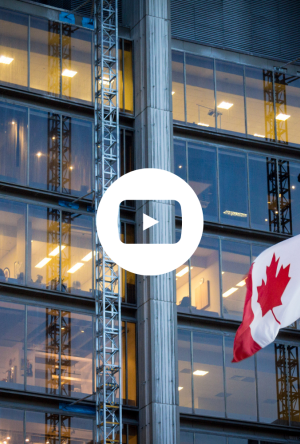
The iGaming Show - EP2 (Evolution Of Online Gaming In Canada With Paul Burns)
As the Canadian regulated sports betting industry propelled high in 2021 through province-ran sportsbooks, 2022 is set to be a big year for international merchants moving in with their iGaming & sports betting offerings. In this episode, we will discuss the evolution of gaming from the viewpoint of the Canadian Gaming Association, the importance of Bill C-218, and what we expect the future of gaming in Canada to look like.
The iGaming Show, presented by Paramount Commerce, is a podcast that will analyze gaming industry trends with experts from various gaming organizations.
Please like, comment, and share this video. Also, stay up to date with our content by subscribing to our YouTube channel.
Read the full episode transcript:
Varad Mehta: Hello everybody.And welcome to the second episode of The iGaming Show, presented by Paramount Commerce. I’m your host, Varad Mehta. And in this podcast, we explore gaming industry trends with experts from various gaming organizations. And in today’s podcast, we will talk about the evolution of online gaming in Canada with Paul Burns, the President of the Canadian Gaming Association. So without further ado, let’s get the show rolling. I’d like to begin by congratulating you on being inducted into the Sports Betting Hall of Fame at SBC North America. I mean for a Canadian to be recognized in America, you’re in the ranks of maybe Drake, Celine Dion, all your popular Canadians.
Paul Burns: I wouldn’t go that far. But it’s nice to be recognized. The work to change the legislation in Canada, unfortunately, took a long time. So it’s nice to be recognizedby the hall of fame. Obviously, good or bad, governments play a big role in the gaming industry. And so I happen to, I guess, have the perseverance and had the support of many across various sectors to who every time I came calling saying,we’re going to try this again, they’re like, okay. I don’t know if I was close to the definition of insanity and repeating the same thing over and over again, getting the same result. But we finally got that, and it’s great. And we’re just starting to see the benefits now, starting to see full benefits for the consumer, for the gaming operators. So it’s going to be very good,exciting times for the industry. And I’m thrilled. It’s great to see this happen.
VM: Definitely. I think to be included in hall of fame, it means that you’ve done a lot of work. Hall of Fame is for the best of the best, right? So it’s truly a privilege to be speaking to you. Speaking of that, sort of connecting that with you. Could you go into how you got associated with the online gaming industry? What’s your background? Maybe a little bit of history about Paul Burns?
PB: Well, my background goes back to being involvedin politics as a political staff an advisor to ministers in the Ontario government. And I got handed a file back in 1996 or 1997 and the Ontario government waslooking at expanding gaming. And so I got the opportunity to work on those files. And like the industry, I’ve met a lot of great people back then, people then that I’m still friends with today. And obviously, it was the first growth and expansion of the casino sector in Ontario at that point in time and watching the gaming industry grow across Canada. So I got into it. I really enjoyed the people. I enjoyed the work. I got to do some interesting things. We as an association came together in 2006, really, with a number of operators, casino operators, suppliers, really saying no one is defending our industry. No one’s speaking up for what we are. There’s more dimensions here to the gaming industry than just making money for government. There’s great careers. There’s great industries. There’s great technology companies. And that was back in 2006. So when you go back to that and you look at where now technology is taking us, the rise of Internet gaming back 2000s, it was something to watch and something we always said, hey, governmenthas got to regulate this. That’s been our position as an industry association. Regulated gaming is good. And you need to regulate online gaming because it’s coming and it’s going to be big. Sure enough, it has been.
VM: Definitely. And I think that’s such a great way to give an overview of how CGA came along back in 2006 and how it’s evolved to now. It’s crazy to think that conversations about online gaming were happening back then or what the potential future was. So that’s kind of interesting. Tne thing that I think really brought a lot of attention to Canada was Bill C-218. Could you maybe break down why that was a really significant bill? Because it really brought it into the mainstream. A lot of media outlets covered it. It sort of kick-started, basically what is now a lot of regulations being passed, hopefully across more provinces.
PB: It was the Safe and Regulated Sports Betting Act, it had a number of numbers attached to it over the years because C-218 was the fourth iteration of the bill. And timing seemed to have worked. The inevitability of sports betting in the 2011–12–13 period, when the first bill went through the House of Commons, sports betting was, oh, yeah, we’ve had legal sports betting in Canada for decades because we had parlay wager. You just couldn’t bet on the outcome of a single event. So you got over the hump of trying to tell people that this isn’t brand new. I would offer you the phrase. It’s like selling beer. We’ve had six packs. Now we want to sell twelves. It’s the same product. We just want to package it differently. And it was surprising to a lotof people, surprising how many folks I came across were betting onlineduring that period of time too. But it was not realizing, hey, by the way, it’s not regulated in Canada. But the timing and because of the pandemic, because of the impact on the land-based side of our business, because of the growth of online, again, combined. The United States has had a couple, three plus years of sports wagering, watching the inevitability of the growth. And really the last group that came to the table took away the last remaining stakeholder that was opposed were professional sports teams, some of the strongest supporters of changing and creating a regulated sports betting marketplace in Canada actually came from the amateur athletic community, from Canada Soccer, from Canadian Olympic Committee, the Canadian Centre for Ethics of Sport, because they recognize it’s protecting athletes,that integrity of sport was important. And we had communities and we had labour and business groups saying, yes, the Chamber of Commerce in Canada, Unifor. The cities of Windsor, Niagara Falls repeatedly passed motions. It was really a great coalition that the gaming industry stood part of and we were one part of it but there were so many others that wanted access. And then the timing I think was being able to get a piece of legislation back into the House of Commons. And thanks to Kevin Waugh as the MP from Saskatoon – MPs draw to see what order they get to introduce private members bills. At the beginning of every Parliament they draw numbers and he drew a very high number. And fortunately he had an interest and so a convergence of coincidences brought us together and he was a fantastic champion in the House to get it done and it was just great timing of coincidence and Kevin having the opportunity.
VM: Definitely. I’m just going to take us a little bit back because I noticed after the passing of that bill, still provinces technically haven’t opened up to international merchants who could move into maybe Ontario let’s say. But province-ran sportsbooks were sort of like open for business for single-event sports betting. So during that, I don’t know if it’s a year, but those few months, did you see a lot of changes happening quickly because as you said these 12 or 14 months have been really eventful. So what did you noticestarted or what were some significant things you noticed as soon as that bill passed?
PB: Well obviously I think what we saw was I think a heightened interest of the product. People going, oh there’s something new here. And obviously you said provincial lottery corporations, some enhanced the products they already, BCLC has always had a quite robust sports platform for many years. And Alberta launched theirs. Ontario launched theirs. So people started to see new products and they understood what this meant. People probably didn’t know what C-218 was or the fact. But what they saw is hey, something’s changed and I’ve gotsome new opportunities and new products.
VM: Why is Ontario so important? Because it seems like it was the first one to act as soon as things started kickstarting regarding online gaming. So what makes Ontario an important market, an iGaming market, maybe in Canada or maybe overall in North America?
PB: Well, Canada has always kind of punched above its weight in some respects in terms of adopting to online gaming. One, we’ve never had any barriers. That’s the simple one right out of the gate. There’s been never any barriers. The US has the Wire Act to deal with. They had federal laws that were more harsher. We just have, why it’s called grey. Simply, where does the bet occur? It’s the legal question that has never been solved. Is it me sitting in my home in Toronto on my device, or is it if I’m betting through an offshore operator, is that the server in the UK or an island or somewhere like that? And the law was never settled, and so no one ever wanted to find out the question. I think because everybody’s afraid, the answer may not go their way. The lost battle of trying to think of ways, without wanting to change laws or wanting to challenge the initial interpretation of the criminal code. It was a losing battle for everybody to face. In reality, the solution has always been in front of us and it’s what Ontario chose: create a regulated marketplace. And if you want, Ontario has chosen, really, a path to ensure that they can invite as much of the grey market as much wants to come, making it easy for them to do, because understand the iGaming world matured allover the place, everywhere else but here. There’s 20 years of regulatory experience in some jurisdictions. But it wasn’t in Canada. So you were kind of last man in. And the AGCO and the government of Ontario respected that, went out and talked to the operators and said, okay, what are the best practices in here? What is the best model? What can we do? They did that, and that’s why they got a model that’s I think it’s fair. It’s been attractive to operators to join and say, I’m going to be part of the regulated marketplace. And so when you look at the volume, the number of those already in the market, the applications I’m hearing, we’re going to be 50 plus operators potentially in a year in Ontario or less than a year. That speaks to the success of the interest of the model. And open license models, they’re not available in North America anywhere else. So it gives everybody a foothold. And so the Ontario government listened, and they brought a lot of the best practices to bear. Because the alternative is you make it uninviting. You spend a lot of time enforcing, and you spend a lot of time trying to keep people out. And we’ve learnt that the Internet is a powerful force, and it’s hard to keep it out. It’s been a disrupter to many industries in many jurisdictions. And gaming is no different.
VM: Definitely. And I think many prominent names like FanDuel and BetMGM, these names have already expanded into Ontario. For those who might be considering moving into Ontario or Canada, what is your elevator pitch for them? What advice do you have for international gaming merchants who want to move into Canada? Because it seems like even with just one province going live with their iGaming market, there is so much talk about Canada. I haven’t heard much about America right now as I have about Canada. I don’t know because we are in Canada, but it just seems like there’s a lot of focus on Canada. So what advice do you have, or what would you pitch to people or merchants who want to move into Canada?
PB: Well, I think, one,you’ve got a knowledgeable customer base, which I think is good. And two, if you’re going to put a footprint down in the country, you’ve got a tremendous opportunity. There’s great depth of talent available here on any facet of your business is here. There’s a very competitive tax climate. There are incentives for digital development work and getting rebates on wages. Our tax and immigration policies are fair in terms of being able to move into the country and establish a business. It’s not very complicated with a little assistance to be able to incorporate yourself, get a bank account and get going. In some countries, it can take months and months and months. It doesn’t do that here. It doesn’t matter where you’re located. And I think that there’s lots of great attributes. And now with a regulatory regime in Ontario as a starting point By all accounts, everybody seems fair and reasonable, and it’s become very attractive and a foothold in North America because there’s only three or four jurisdictions in North America that are for online gaming. One of those is Ontario. Three of those are in the United States. It’s in its early days. There’s huge growth in the Americas heading all the way down to Brazil soon, hopefully pass their sports betting legislation and get active in the marketplace for the people of Brazil. I think you want to come here, it’s a great launching pad, and you’ve got a diverse customer base in Ontario. Immigration is the backbone of Canada in terms of helping us grow. And the diverse population, just from betting products, from rugby to cricket to curling to soccer, football. I mean, there’s a demand for all these products. That diversity is great. And I think that you can test your products in a pretty diverse market.
VM: I think you used a really interesting term, which sort of brings me to my last question. You used the term launchpad. What do you see Canada’s online gaming future to be? Is it more provinces following what Ontario did? Do you see innovations, more merchants moving in? What is the future of Canada?
PB: Well, I think that the other provinces in Canada will take a serious look at what Ontario has done with their market and how they’ve chosen to regulate it. Will anybody replicate it the same? I don’t know. What I hope they do is engage the industry the way Ontario did. That they talk about what’s best for their jurisdiction, talk to the gaming industry, talk to all your stakeholders, because that’s what Ontario did. And they’re still having those conversations as we go forward. And that’s important. And they need to enact on the things they talk about. But that has to happen because then they’ll find out what will work best, what’s fair for everybody, what creates that level playing field for your current industry that’s in your jurisdiction and new entrants.
VM: Oh, definitely. And I think all the excitement and as I compared you to maybe the likes of Drake or some popular Canadian figure, there’s just so much happening right now. And as you say, whether it’s consumer protection, businesses thriving, Canada is so strong that way. And things should remain and grow in Canada. So I think just to know all these things from you is such a pleasure. And I really want to thank you for your time. I know it must be a crazy-busy time for you. So thank you so much, Paul. And it’s been a privilege speaking to you. Thank you.
PB: Thank you. And to everybody at Paramount, as great CGA members that you’ve been and supporting the association, the industry in Canada. We’re grateful for all the work that you guys have been doing. So it’s great to chat. And I appreciate you having me.
VM: Thank you, sir. Thank you.
PB: Take care.
VM: From a single-event sports betting bill being introduced a decade ago to Ontario going live with its regulated iGaming market, Canada’s online gaming industry has evolved significantly. I want to thank Paul Burns, the President of the Canadian Gaming Association, for joining us today and providing his expertise. If you enjoyed today’s episode, please don’t forget to, like, share and subscribe. If you have any questions for Paul or us, do comment them down below. I would also like to mention that the Paramount Commerce team will be exhibiting at SiGMA Americas, which is coming to Canada for the very first time. If you want to know more about expanding into Canada and how our team can help your iGaming business, please visit us at Booth G1 at the Enercare Centre in Toronto on June 7th and June 8th. Also, our team is hosting the gaming social networking event of the season. So to register, please reach out to our team by visiting paramountcommerce.com. Thank you for tuning into The iGaming show presented by Paramount Commerce. I’m your host, Varad Mehta. And until next time, keep gaming.
Stay tuned for more podcast episodes!



























